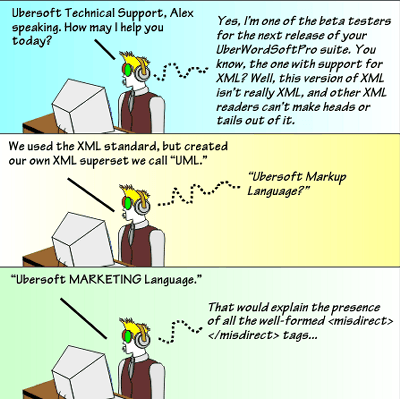
From Help Desk, by yours truly.
Once upon a time there was a group named OASIS (Organization for the Advancement of Structured Information Standards), a
“not-for-profit, global consortium that drives the development, convergence and adoption of e-business standards.”
The purpose of OASIS was, simply, to come up with a bunch of standards that its members would agree on, so that when business technology was built it would operate in such a way so that it would work everywhere. The groups sponsors included giants in the computer industry, such as Sun Microsystems, Hewlett-Packard, IBM, and even Microsoft. The group would meet to try and work out, for example, a standard way to exchange information about security vulnerabilities of applications exposed to networks, or a universally accessable system for writing structured documents using SGML or XML. Things that were useful, in other words, for business that needed to transmit information from one place to another without worrying about whether or not the place receiving the information was going to understand what was being sent.
One day OASIS decided it would be a great idea if there was an open standard for word processing application suites that provided a universal file format for text documents, spreadsheets, charts, and graphics. This standard, which they called OpenDocument, was a royalty-free file format that used another standard, XML, as the way that information in these documents would be stored. Any word processing program could use this standard royalty-free, and any word processing program that did use this standard would be able to read a file created by any other word processing program that also supported this standard. Suddenly it was possible to focus on creating your information instead of worrying over which program to use to create it.
On May 23, 2005, OASIS’ members approved the OpenDocument standard.
On August 29, 2005, Peter Quinn, Chief Information Officer of the Information Technology Division of the Commonwealth of Massachusetts announced that the state would use OpenDocument as its official documentation standard.
Shortly thereafter, Microsoft had a cow.
Microsoft would rather Massachusetts not use the OpenDocument standard, mostly because Office 2003 doesn’t support it. Instead, it uses it’s own flavor of XML for their file format, and this “flavor” is a bit more… proprietary.
How much more proprietary, you ask?
In order for other applications to read and write to documents stored in this file format, it is necessary for Microsoft to issue a “Patent License.”
What is a “Patent License,” you ask? Essentially, this license says three things:
1. Microsoft “may have” patents (existing and/or pending) that are integral to the file format.
2. Any application that attempts to read or write to a file using this file format would infinge on these patents.
3. But we’re going to let you do it anyway, as long as you post a notice on whatever application that you’re using acknowledging that it incorporates Microsoft’s intellectual property, and provide a link to the Legal Notice for the Microsoft Office 3003 XML Reference Schemas.
Now let’s give credit where credit is due: that’s a pretty big step for Microsoft, a company that is not exactly known for sharing in a way that is very similiar to Arsenic not exactly being known as an effective remedy for common ailments. That said, it also wasn’t what Massachusetts wanted: Massachusetts wanted a truly open file format, and Microsoft’s, while available for use, still belonged to Microsoft.
An article in ZDNet UK states that the Commonwealth of Massachusetts had legal concerns about using the format.
Apparently when you create a license for using a file format, and that license discusses patents, it makes lawyers nervous. Who knew?
Microsoft, of course, responded with it’s usual penchant for twinspeech when, according to the same article, a Microsoft general manager described Massachussetts’ decision as a “narrowing of the approach to openness.”
A… what?
If the idea of an open format is that “anyone can use this format, royalty-free,” and Microsoft’s proprietary format states that “anyone can use this format, royalty-free, but only under certain conditions,” then it seems clear that it is Microsoft, not Massachusetts, that is coming up short. In fact, the OpenDocument format is so open that Microsoft could support it Microsoft Office, if they really wanted to.
They really don’t. According to an article on CRN — the article that describes Microsoft giving birth to a milk-producing farm animal — they have their reasons:
First, they claim, it is an “inferior file format” and not compatible with older versions of Microsoft Office. Oddly enough, the fact that the next version of Microsoft Office does not support OpenDocument does not seem to be an equally pressing problem for Microsoft.
Second, they continue, OpenDocument doesn’t support the following data:
- Pictures
- Audio
- Video
- Charts
- Maps
- Voice
- Voice-Over-IP
- and unmentioned “other stuff”
Note that these bullet points are taken directly from a statement made by Alan Yates, described in the article as “general manager of Microsoft’s Information Worker Business Strategy.” Also note that the beta of the 2.0 version of Open Office, a free software office suite, contains an integrated graphics program and a spreadsheet application that can, you know, create graphics. Also note that “Charts” and “Maps” are essentially Pictures, that “Voice” is essentially Audio and that Voice-Over-IP is essentially using the Internet to talk to someone else on the Internet.
The only people I can see being interested in that feature are virus authors.
But there it is: Massachusetts has taken the unusual and encouraging step of trying to adopt a standard that was designed to make information accessible to just about everyone, and Microsoft, unable to strongarm the Commonwealth into adopting a file format they think they can make more money from, is now whining about it to anyone who will listen.
It’s only a matter of time before we hear more song and dance from the “Free Software and Open Standards will destroy our American Way of Life” camp, finishing up with a hearty refrain of “If You’re Not Selling It, You Must Be a Communist.”
Communists like, oh, IBM. They don’t call them Redbooks for nothing…


